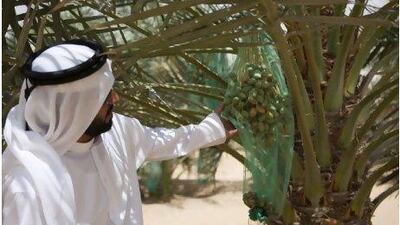LIWA // When Awsha Atiq was told her farm in Al Ghweitat was one of the top 15 winners of the Liwa Date Festival's first competition, she was thrilled.
"I never expected us to be part of the winners," she said, "because last year, our farm was more active and so the production of our dates was much higher."
Mrs Atiq and her husband, Batal Sultan Al Murar, entered the competition's Dabbas category this week, along with 500 other farmers from Liwa. The couple won fourth place.
And once their dates had been judged among the best, it was only a matter of time before the experts and judges came calling.
"We're looking at how well the farmer maintains and cleans his date palm trees," said Dr Hasan Shabana, a date palm expert at the Arab Organisation for Agricultural Development.
"We check if the trees are pruned or not, how good the yield is and the overall cleanliness of the farm as well as how distant the trees are from each other."
The couple grow many varieties of date, most are Al Khalas, a popular type in the UAE at both half-ripened (rutab) and fully ripened (tamar) stages.
"They're usually the most expensive dates because they're very flavoursome and their sweetness isn't very high," said Dr Shabana.
The seven-year-old farm could have produced more, said Mrs Atiq, but for the decision to move the festival forward to make space for a new festival in Ajman.
"Many of our Al Khalas dates haven't ripened yet," she said. "Usually, it takes 10 to 15 more days from now, so I'm a bit disappointed the festival started earlier".
However she plans to take part in the festival again next year - as long as her 700 palm trees keeps producing fruit.
That, according to the judges, should be no problem. "Their system of irrigation, the drip, is quite popular and efficient," said Dr Shabana, "because the palm trees will use 85 per cent of the water provided."
While drip irrigation, which uses perforated pipes that run next to rows of crops or buried along their root lines, is more expensive to install, it is the most efficient method available. It results in considerably less evaporation than other techniques, such as furrow or flood irrigation where a large amount of water flows on the ground among the crops.
"With other methods of irrigation, most of the water will go to waste," said Dr Shabana.
Dr Shabana was pleased with the health of the farmer's trees. "You can tell their plants are healthy and clean because of how green the leaves are," he said. "So it's definitely passed the satisfactory bar".
Another winning farmer was Awad bin Harmous Al Mazrouei, who despite being just 27 has been taking care of his family farm for 17 years.
"My aim is to grow my farm to meet the demanded varieties on the market," he said. "It really means the world to me."
Mr Mazrouei and his wife Fatima Faraj al Mansouri won seventh place in the festival's Dabbas competition.
"I've got about 800 date palm trees on my land and I'm looking into developing my farming techniques as the Ministry of Environment and Water has told me."
Mr Mazrouei's farm qualified as a winner in many ways, according to Dr Shabana. "He also placed bags over his dates to protect them from diseases and insects such as wasps," he said.
Some problems remained, though. "Although his farm is hygienic, he does need to prune his trees more, which means cutting off the tree's dead fronds," he said.
Overall, he said, Mrs Atiq's farm was cleaner. "The trunks of the first farm's palm trees were larger which means they were healthier," he said.
Mr Mazrouei's farm also had three to four palm trees growing together, rather than spaced apart - "like old times", and far from ideal. "It's not advised because the trees have to share the same source of water and minerals," he said.
Mr Mazrouei hopes to use his winnings to boost production. "Each branch has 20 dates so if he has more branches, say ten dates per branch, each date will be bigger" said Dr Shabana.
"In that sense, each fruit will feed off more water and minerals because they are divided into 10 instead of 20."
Mr Mazrouei also plans on covering the branches of his trees with plastic bags to protect them from insects and dust, "just like a filter".
@ For more on LIWA DATE FESTIVAL visit thenational.ae/topics

